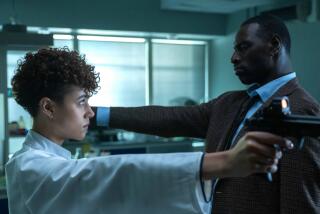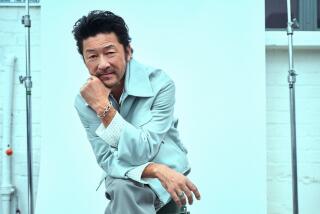Q&A; WITH DAVID CARRADINE : A Kung Fu Master Reincarnate
Except for the fact that he’s not wearing socks, David Carradine doesn’t look much like a Shaolin priest. His sport coat is a burgundy tweed, his shirt unbuttoned just far enough to show the dog tags--vestiges of his early ‘60s Army stint--hanging around his neck. He is chain-smoking English cigarettes, coughing on a regular basis and drinking club soda as he vaguely hints that he’s still feeling the after-effects of the previous night’s beverage, evidently something a little stronger.
It has been 21 years since Carradine, now 56, first played the role of Kwai Chang Caine, the wandering Chinese-American warrior-philosopher-priest in the original “Kung Fu” television series. And although he’s played other parts (including Woody Guthrie in 1976’s “Bound for Glory”) it is the character of Caine that has defined his career.
Before “Kung Fu , “ Carradine’s reputation was as a dancer, a Broadway actor and the oldest son of what would become one of America’s most successful acting families. (David’s father was character actor John Carradine. His younger half-brothers include Keith and Robert Carradine.) But the success of “Kung Fu” sent Carradine down a path filled with martial arts-related projects--a parade of low-budget fantasy films chock-full of high kicks, sword fights and flute music.
Carradine starred in a “Kung Fu” TV movie in 1986 and returned this year with a new syndicated version of the series, “Kung Fu: The Legend Continues” (Wednesdays at 9 p.m., Channel 13), set in a modern city with Carradine playing the grandson of his original Caine character.
Carradine, accompanied by his wife, Gail, sat down for an interview at a restaurant not far from their San Fernando Valley ranch.
Question: Why is the new version of “Kung Fu” in a modern setting? Why not keep it in the old West?
Answer: We tried that and couldn’t get a buyer. To me the precepts on which the series is based have nothing to do with what year it is.
The idea is of Caine being a man without portfolio who walks from place to place trying to help people and when he gets into trouble he has to use his kung fu mastery. And as far as playing the original Caine’s grandson, the point that makes this thing work is that my character is not changed in the least from the guy who was in the old series. You might as well say I arrived in Christopher Lloyd’s DeLorean, ‘cause I’m the same character. I’m dressed almost the same and I don’t act any differently about anything. The other answer would be that I’m 156 years old and I just don’t show it.
Q: And why did you want to play this character again?
A: I’ve thought for years that I walked off the original series too early. ‘Cause that’s what happened. It wasn’t canceled. I just left. And there were things about kung fu we never explored.
Q: This show is a more accurate reflection of what kung fu represents than the original?
A: The first series never got where I wanted it to be. That’s the reason I walked. For instance, I’d have a scene with a little kid and they’d come in with the script and I’d look at the dialogue and say to the writer, “This isn’t ‘Kung Fu.’ This is ‘The Rifleman.’ I don’t want to do ‘The Rifleman.’ ”
Q: In the new movie “Dragon,” there are accusations that you got the part of Caine instead of Bruce Lee because producers didn’t want to cast an ethnic Chinese actor. What did you know about that?
A: I only know what I know. And what I know is that I was sent a script and I said yes. What was I supposed to do, say no? I didn’t even know at the time that Bruce Lee had been considered. At that point in his career Bruce, as an actor, was a comedian. He had never shown any ability to do any dramatic acting. It was all fighting and jokes. What they needed for that part was somebody who could have a brooding quiet power. And I had more of that than Bruce did.
Q: Do you find a lot of people want to test you out? You must get drunk guys in bars taking swings at you all the time.
A: Every once in a while there’s some stupidity that goes on in a bar, but one way to avoid that is I just don’t spend a lot of time in bars. Most of the time, these incidents are over before they start. Sometimes I can see them coming and I just say, “Let’s leave.” Sometimes I can stop them from happening just by giving the guy a certain kind of a look. And just being friendly makes a difference, too.
Q: But that can’t always work.
A: There was an incident in Argentina, when I was making a film called “The Warrior and the Sorceress.” There were like 40, 50 sword fighters and martial artists on the set and one of the sword fighters challenged me. I said, “Look, you don’t want to fight me. Nobody wants to fight me. You gotta be crazy to want to fight me.”
He just kept insisting and finally he threw a punch. So I slipped it, Muhammad Ali style. And he threw another one. And I blocked it. Then he threw a third punch, which was a little much, so I caught it, got a hold his shoulder, turned him around so he was facing the other way, took his feet out from under him, sat him down on the ground and kissed him all over his head and shoulders. Then he got mad at me for tearing his T-shirt. I said, “What are you talking about? This T-shirt is now worth a hundred bucks. Want me to sign it?” He didn’t.
Q: And what about the people who expect you to be like Caine in every way, the perfect Zen master.
A: I think people are a little surprised sometimes at the level on which I actually talk. I don’t talk like Caine. And every once in a while somebody is surprised because I smoke and I drink. But I don’t feel that is a contradiction.
When we play the thing on television, we leave out the smoking and drinking. That’s a performance. That is the impression we are trying to give to the world. It’s like the Monsignor who runs the church, he may be back in the rectory smoking a cigar and having a drink of brandy, but he’s still a priest. My role in kung fu--in the art of kung fu, not the series--is not as a practitioner. My role is that of an evangelist, which is an entirely different thing.
More to Read
The complete guide to home viewing
Get Screen Gab for everything about the TV shows and streaming movies everyone’s talking about.
You may occasionally receive promotional content from the Los Angeles Times.






